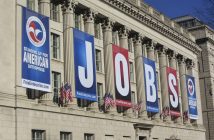The global COVID-19 pandemic – which originated in the Wuhan region of China, and which initially spread in large part because of the Beijing communist regime’s cover-up – has hit the American and other Western economies particularly hard. As a result of the coronavirus, 26 million Americans are now unemployed, a level not seen since the Great Depression. Many businesses are, at least temporarily, shut down, and – despite coronavirus relief checks and other policies meant to soften the blow – large numbers of Americans are suffering financially. And even when the pandemic subsides and the country is reopened for business, rebuilding our battered economy and returning to prosperity and near full employment will not happen overnight. That is why we must emphasize national self-reliance and prioritize getting Americans back to work first.
Globalist Problems
If the coronavirus pandemic has exposed one thing, it is certainly the flaws of globalism and the myopia of its proponents. Here we understand globalism as both an ideology and an economic arrangement which treats national sovereignty and borders as at best irrelevant and, more frequently, as obstacles to the mass international movement of goods, capital, and people. Global “interdependence” was supposed to make the world a more prosperous, peaceful, and better place, or so the theory went.
While globalization offered benefits – including, e.g., more affordable consumer electronics and easier global travel – it also brought with it some serious problems. Increasing levels of mass, unchecked migration to America and other Western nations became a key feature of the globalist “order.” Employers also became increasingly reliant on cheap foreign labor, either in the form of outsourcing jobs to places like China, or importing foreign guest workers from countries like India. As a result, American workers either lost their jobs or faced stiffer foreign competition and stagnant wages. In the process, we also naïvely allowed ourselves to become dependent on communist China for much of what we import, including vital pharmaceuticals. And the relative ease and widespread accessibility of international travel – including regular visits by immigrants to their homelands – undeniably played a major role in allowing the coronavirus to spread globally at such a rapid pace.
American Solutions
While COVID-19 has exposed the serious defects of globalism, it has simultaneously reinforced the need for greater American self-reliance. There are several things that we can – and should do – going forward.
First, we should promote policies, such as tax breaks and trimming “red tape,” that encourage the return of manufacturing and other outsourced jobs to the United States. The goal would be to accomplish two major objectives at once: putting Americans back to work while making our country less economically dependent on other nations. In addition, U.S. Immigration and Customs should implement a more aggressive worksite enforcement program, to make sure that employers are hiring Americans as opposed to illegal aliens or other unauthorized foreign nationals.
Secondly, any post-COVID-19 economic recovery policy should include either a complete immigration moratorium, or at least a substantial reduction in immigration levels. Given the current unemployment levels, is there any valid justification for one million plus permanent resident admissions each year? President Trump’s recent moratorium is a step in the right direction, but it exempts multiple categories of foreign nationals – including guestworkers – and lasts only 60 days. To truly protect American workers, it should be expanded and extended. Hence, it was encouraging to hear administration officials speak of further reviews and action in the near future.
Third, it is high time to eliminate – or at the very least reduce, restrict, and reform – foreign guestworker programs such as the H-1B and H-2A visas, as well as F-1 student optional practical training. The purpose of guestworker programs should be to quickly fill temporary shortages of either high- or low-skilled labor. Instead, they have become permanent cheap labor subsidies – or a version of “corporate welfare” – for big business. Because these programs mean job competition and stagnant wages for Americans, they were a problem even during the booming economy of the pre-coronavirus era. Now, however, there are no more excuses not to rein in these programs which hurt U.S. workers. The go-to plea that “we don’t have enough workers” – which is trotted out whenever official unemployment levels are low – certainly no longer holds any water.
As another FAIR blog points out, we should also revisit an amendment to the 2009 economic stimulus, which prohibited businesses and contractors who had received TARP government bailout funds from hiring H-1B guestworkers. While the duration of the original amendment was only two years and applied only to TARP beneficiaries, an expanded and extended version would certainly be in order.
The proponents of globalism would have us believe that there are no viable alternatives to their open-borders, anti-American-worker, and anti-sovereignty policies. Fatalism, however, has never been the American way. We have a choice: a failing globalist agenda, or a program of national self-reliance that prioritizes American workers.




